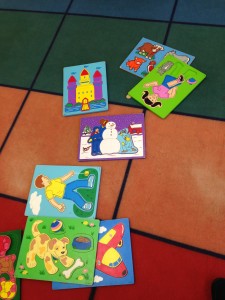
(This tip may be useful to some established teachers as well as newbies.)
The teacher said to me, “At 1:15, we have gross motor.”
She teaches in an official, district preschool. This attractive brick building is filled with kids who need extra help with language or other skills necessary for elementary school. Some of these kids are in diapers.
The school doesn’t have recess anymore. Neither does its elementary counterpart. That might imply that America’s children are not working all the time. So we go to “gross motor,” where the kids play on the slides and crawl through tunnels, or sometimes just chase each other in circles.
We don’t have playtime, either. We have small groups. In small groups, children do fine motor work in the sandbox (i.e. pour sand from one receptacle to another while the teacher tries to keep the sand in the box), build walls with cardboard bricks, set up wooden train tracks, then run trains along the track, put farm animals in plastic barns, etc. Small groups requires exceptional teacher alertness. Fights over puppets can start at any time.
I am waiting for snack time to be labelled “nutritional awareness.” Teachers may be told to use that time to add calories. Why waste an opportunity like snack time? Three- and four-year-olds could be trying to add up the calories in their milk and apples.
Sigh.
Eduhonesty: But I am serious about my tip. Education is filled with jargon nowadays. This tip is for newbies and established teachers. In many schools, learning and using Eduspeak will help establish you as up-to-date. If everyone in your school is doing a “criterion check,” you don’t want to be “finding out what they know,” — even if the two are equivalent concepts. Your lesson plan will sound better if you are using “manipulatives.” not “blocks.” If everyone is doing, “do-nows,” you should probably stay away from “bellringers” or “openers.”
Use of technical vocabulary and the established terms and acronyms of your district has become significantly more important for teachers than in the past, as job security evaporates and educational fashions become de rigueur in the hands of desperate administrators. How do you determine if you need to add jargon to your lesson plans and communications? Identify who is rising in the teacher hierarchy. Who just became head of the math department? Who was told to apply for the newly opened teacher-coach position? Find those people and ask to look at their lesson plans and other appropriate official communications. Are these plans and communications filled with Edulingo? If so, it’s time to start filing away new acronyms and phrases.
Want to have some fun with this? Visit http://www.sciencegeek.net/lingo.html and generate some jargon of your own. We should all maximize holistic strategies through the collaborative process at times, as we engage hands-on proficiencies with a laser-like focus on competencies, reinventing emerging professional learning communities through high impact practices.
Or something like that. 🙂
